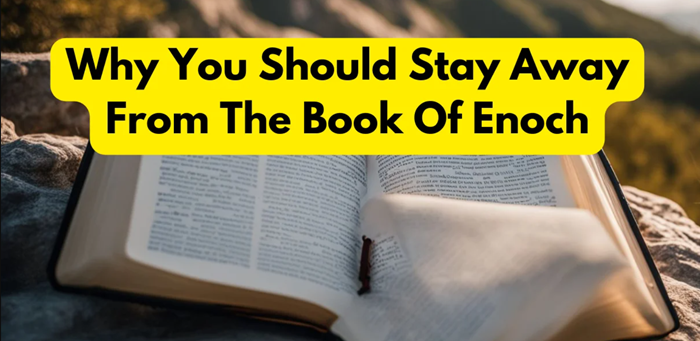The Book of Enoch, also known as 1 Enoch, is an ancient Jewish text attributed to Enoch, the great-grandfather of Noah. Firstly, the uncertainty surrounding its authorship and date of composition made it challenging to affirm its authority. Secondly, its theological views and interpretations on angels, cosmology, and eschatology differed from the mainstream Jewish and early Christian beliefs that were later codified into the canon.
Why was the book of Enoch removed from the bible
The Book of Enoch was removed from the Bible for several reasons, primarily due to issues of authenticity, theological disagreement, and its association with fringe beliefs. Early Christian leaders and Jewish scholars questioned the text’s authenticity and authorship, leading to its exclusion from the canonical scriptures. Theological concerns also played a role; the Book of Enoch presents ideas and narratives, such as detailed accounts of fallen angels and apocalyptic visions, that diverged significantly from mainstream Christian and Jewish teachings. Its influence on various esoteric and mystical traditions further contributed to its rejection by those who sought to maintain doctrinal purity and coherence within the canon. Consequently, the Book of Enoch was excluded from both the Jewish and Christian canons, reflecting its controversial status and the desire to preserve a unified and orthodox religious framework.
Who was Enoch in the Bible
Book of Enoch :Historical and Canonical Controversies
One primary reason to stay away from the Book of Enoch is its controversial status within the canon of religious scriptures. Unlike other texts included in the Bible, the Book of Enoch is not universally accepted as part of the canonical scriptures in Judaism or Christianity. The canonical Bible, which is widely accepted by most denominations, does not include the Book of Enoch. This exclusion suggests that the text was considered non-authoritative or heretical by many early religious leaders. For those seeking guidance from texts that are widely accepted by mainstream religious communities, avoiding the Book of Enoch can help maintain alignment with accepted doctrines and teachings.
Book of Enoch :Questionable Authenticity
Another reason to stay away from the Book of Enoch is the question of its authenticity and authorship. The Book of Enoch claims to be written by Enoch, the great-grandfather of Noah, but scholars have debated its true authorship. The text is believed to have been written by multiple authors over several centuries, with parts of it potentially being compiled from earlier sources. The lack of clear, verifiable authorship can raise doubts about the text’s credibility and the accuracy of its content. Those seeking reliable spiritual or religious texts may find it prudent to avoid sources with questionable authenticity.
Book of Enoch :Theological Discrepancies
The Book of Enoch presents theological ideas that can be at odds with mainstream religious teachings. For example, it features elaborate descriptions of angels, the Nephilim (giant offspring of fallen angels and human women), and apocalyptic visions that are not found in the canonical Bible. Some of its teachings about the end times and the nature of angels diverge significantly from traditional interpretations. This divergence can lead to confusion or misinterpretation of core religious doctrines. Therefore, those who adhere to traditional teachings may prefer to stay away from the Book of Enoch to avoid conflicting theological perspectives.
Book of Enoch :Potential for Misinterpretation
Due to its complex symbolism and apocalyptic visions, the Book of Enoch can be challenging to interpret. The text’s rich and often cryptic imagery may lead to misinterpretation, especially for those not well-versed in its historical and cultural context. Misinterpretations of such texts can lead to confusion or misguided beliefs. Staying away from the Book of Enoch can help prevent these issues and ensure that one’s religious or spiritual understanding is based on clearer and more straightforward sources.
Book of Enoch :Influence on Occult and Esoteric Traditions
The Book of Enoch has influenced various occult and esoteric traditions over the centuries. Its themes and narratives have been adopted by some groups that engage in mystical or esoteric practices. For those who wish to avoid such associations or who are concerned about the potential impact of these influences on their beliefs, staying away from the Book of Enoch may be a prudent choice. This helps ensure that one’s spiritual practices and beliefs are not inadvertently shaped by esoteric or occult traditions.
Book of Enoch :Historical Context and Cultural Bias
Understanding the Book of Enoch requires an appreciation of its historical and cultural context. The text was written in a period of significant religious and cultural upheaval, and it reflects the anxieties and beliefs of its time. Its contents, including descriptions of fallen angels and apocalyptic visions, are deeply rooted in the historical and cultural milieu of Second Temple Judaism. Those seeking religious or spiritual texts that are more aligned with contemporary understanding or that are free from ancient cultural biases may prefer to stay away from the Book of Enoch.
Book of Enoch :The Book of Enoch and the Christian Tradition
For Christians, staying away from the Book of Enoch is particularly relevant due to its limited acceptance within mainstream Christian traditions. While some early Christians considered it significant, it was ultimately excluded from the canonical Bible. The text’s divergence from core Christian teachings and its exclusion from the Christian canon suggest that it may not align with orthodox Christian beliefs. Christians seeking texts that are consistent with their faith’s teachings and traditions may therefore opt to avoid the Book of Enoch.
Book of Enoch :The Impact on Modern Faith Practices
In modern faith practices, adhering to texts that are widely accepted and recognized within one’s religious tradition is often emphasized. The Book of Enoch, with its controversial status and complex teachings, may not offer the same level of clarity or acceptance as canonical texts. Staying away from the Book of Enoch can help individuals focus on texts and teachings that are more universally accepted and that provide clearer guidance for contemporary faith practices.
Conclusion
In conclusion, there are several reasons why staying away from the Book of Enoch might be advisable. Its controversial status within the canon of religious scriptures, questionable authenticity, theological discrepancies, potential for misinterpretation, influence on occult and esoteric traditions, historical context, and limited acceptance within mainstream Christian traditions all contribute to the rationale for avoiding this text. By focusing on texts with clearer acceptance and alignment with one’s religious beliefs, individuals can maintain a more coherent and well-grounded spiritual practice.
You may also like:

